October 26, 2016
Gary Libman
1943-2016
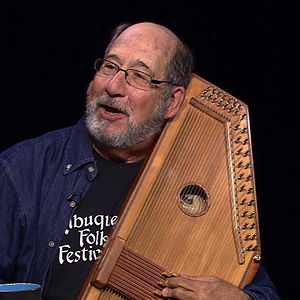
On October 18, 2016 ABQ FOLK FEST Director Gary Libman, 73, beloved husband, father, uncle, grandfather, friend, and community leader, passed away after a sixteen-month courageous and gracefully fought struggle with leukemia.
Gary was born on May 4, 1943 in Chicago, IL, to Benjamin and Frieda Libman. He is survived by his wife Erika Gerety; son Daniel Libman (Molly McNett); daughter Amy Cohen (Joseph Cohen); son Marc Libman (Christina Lee); grandchildren Ben, Madeleine, Miya, Rose, Oscar, Miles. Held in special memory by Norma Libman. Brother of the late Jack and Alan Libman. A beloved uncle and cousin and friend to many.
There will be a graveside service for Gary on Friday, October 28, at 11:00 am to 12:00 pm at Fairview Cemetery, 700 Yale Blvd, in Albuquerque, NM. The French Mortuary web page includes a map, along with a place to post your condolences and reflections on the many ways Gary touched our lives and to affirm the love and support we extend to Erika.
After the service, we are invited to sit Shiva at Peter and Trylla Esherick's home at 1125 Castellano Rd SE, Albuquerque, NM 87123. In the Shiva tradition, we will share food and memories and community. People are free to come and go until about sundown. Primary food and soft beverages will be provided. Potluck-style sides, snacks, or favorite beverages to share are welcome from people who are in town and able to contribute.
Please bring your musical instruments and your voices to join in a celebration of Gary’s life and his love of music and community and to carry his spirit into the night.
The non-profit Albuquerque Folk Festival, was Gary’s passion. He loved it because of its ability to bring music, light, community, dance, laughter, and happiness to the world -- as he himself did.
In lieu of flowers, donations may be sent to: Albuquerque Folk Festival, PO Box 4837, Albuquerque NM, 87106; or submitted online.
|
Gary's Life
Gary was the second of three sons to two wonderful parents, Benjamin and Frieda. His father, a Jewish immigrant who came over on the “last boat” heading to America from Hitler’s Europe, met and married Frieda Sax and settled in the “Great Vest Side of Chicago,” as Gary always referred to it. Many of the friends he made in school remained close until the end, and it was in Chicago that he met and married his childhood sweetheart, Norma Granat. They had three talented, thoughtful, intelligent children, Daniel, Amy, and Marc and six wonderful grandchildren, Benjamin, Madeleine, Miya, Rose, Oscar, and Miles. Gary was justifiably proud of all of them.
One of Gary’s traditions was to designate a special day each year for each of his children, during which the child of the day could do whatever he or she wanted within—or nearly within—reason. Each summer, Gary and Norma had adventurous family vacations including river rafting, dude ranches, National Parks, and other activities throughout the country. As father, uncle, and grandfather, his relationships were characterized by playfulness, encouragement, joy, and laughter. A talented musician—Gary played clarinet, banjo, and autoharp—he encouraged his children and grandchildren to learn and love music. His son, Marc, is a fabulous piano player, and his grandchildren have continued a musical tradition and are themselves excellent musicians
Gary studied dentistry, but eventually found his true calling: microbiology. During his tenure, he owned a number of patents, developed several unique techniques and specialized inventions, and authored or co-authored a number of professional papers. Early in his career as a microbiologist, he worked for the Mars Candy Company. He liked to tell the story that after he proudly announced to the secretary filling out the birth certificate for his first son, Daniel, that he was a microbiologist with Mars Candy, the birth certificate subsequently arrived in the mail with the notation: “Father’s occupation: Works in Candy Store”.
Within a few years, he began his 23-year career with Abbott Laboratories, a large agricultural and pharmaceutical company headquartered in Chicago. He specialized in quality control for the pharmaceutical and agricultural division and headed up the regulatory sector of the international division, traveling around the globe ensuring that Abbott’s worldwide plants met stringent health and safety requirements. Though known for his genial good nature, he could also be tough when the situation warranted. More than once, he shut down a plant or stopped a shipment until potential health hazards had been resolved. When asked how difficult it was to make these decisions, Gary responded by saying it was simply the right thing to do to protect consumers.
During his career at Abbott Laboratories, and afterwards in private practice, Gary was honored with many prestigious positions: He served as the Vice President of Regulatory Affairs and Quality Assurance for Emerald Bio Agriculture; he held various management positions in Quality Assurance and Regulatory Affairs for Abbott Laboratories; he taught Anatomy and Physiology at a community college in Des Plaines, Illinois; he served on the Board of Directors of the Organic Materials Review Institute and the Biopesticide Industry Alliance in Washington, D.C., for which he also headed both the Regulatory Committee and the Legislative Committee; and he was a key presenter and contributor to the Pesticide Program Dialogue Committee.
After retiring from Abbott, Gary and Norma moved to Albuquerque, where he established a consulting business focusing on quality assurance and on guiding companies through EPA’s complex regulatory requirements for new products. He was especially proud of getting approval for environmentally friendly organic pesticides, including one based on oregano. Throughout his career, he was frequently consulted as a subject matter expert.
Gary always had passion for music. He was the first musician in his family. As a child Gary started on fiddle and then clarinet. He often told the story of having tears of joy listening to the guest French horn player from the Chicago Symphony, sitting behind him with the rest of Gary’s all-city high school guest orchestra for a performance of Prokofiev’s Peter and the Wolf. Throughout his life, Gary kept a baton in his car to conduct classical music as he drove, fortunately never resulting in an accident with imperiled nearby drivers. As an adult he learned autoharp from master musician Brian Bowers, through a connection at the Chicago School of Folk Music. Then he learned to play his favorite instrument, the banjo.
Gary loved all music: classical, folk, opera, show-tunes, klezmer and more. His passion was contagious, and he took an active role in the music community. In Placitas, he was president of the Placitas Artist Series, scheduling an annual music and art series. He also founded and performed for many years with the Placitas Mountain Band. Gary started the group “Shlomo and the Adobes.” Though the Adobes were a distinct group already. Gary asked them to join him for Klezmer gigs, gathered music, and coordinated gigs. They play much of that music still today. He also was a member of the Albuquerque Megaband and the contra dance band, Cheap Shots, with whom he played his last concert at this year’s Albuquerque Folk Festival in June.
Gary was president, director, and chief cheerleader of the Albuquerque Folk Festival (AFF), positions he actively maintained throughout most of his illness. Although Gary would be the first to acknowledge the role of the 600+ AFF volunteers, it was his passion, leadership skills, and good cheer that helped to integrate the large and disparate folk music and dance community to make AFF the premier participatory music festival in the Southwest. He was the public face of the Festival, appearing on radio and TV each year, being interviewed by local newspapers, handling an astonishing number of calls and emails with grace, gratitude, and admirable patience. In 2012, Gary was instrumental in moving the Festival to its current, beautiful location at the Albuquerque Balloon Museum. He worked so effectively with the museum’s staff that he was appointed by the Mayor to the board of the Balloon Museum.
In addition, he served on the Board of Directors of the Southwest Bluegrass and Traditional Music Association, and he was a volunteer staff member of FolkMADS (Folk Music and Dance Society) for which he hosted the annual dance-camp talent show and led late-night jams after the dancing ended.
During the years of his intense activity in the Albuquerque music scene, Gary met and fell in love with Erika Gerety. They were married in October 2012. Erika said that the two of them spent four years of bliss sharing music, traveling in and out of the country, camping, attending music and dance festivals, organizing the Albuquerque Folk Festival, supporting various music communities, and sharing their joy with others and sharing in the joy of others. They developed strong and lasting bonds with family and friends. Gary became a part of Erika’s extended family. He loved them and they all loved him. He even facilitated a trip to visit Erika’s son and daughter-in-law in Morocco at a remote Peace Corp site. Erika summed it up as “ a lifetime of wonderful memories packed into a short time.”
One of Gary’s favorite music activities was participating in the annual Walnut Valley Festival in Winfield, Kansas, that attracts many of the best acoustic musicians in the country. The official festival lasts four days, but many who camp there, including Gary and Erika, stretched that to twelve days. He was a key organizer of Pick-o de Gallo camp that consists of members from New Mexico and Kansas and that hosts wonderful jams, memorable feasts, and hours-long, laughter-filled morning coffee clutches. Gary also delighted in his association with Carp Camp, an acoustic folk-instrument orchestra of 50 or so musicians--many of whom are national champions on their instrument--that played until 3:00 or 4:00 a.m. each night. Gary took clarinet lead on a number of the tunes and was always at the head of the annual Carp Camp parade along-side Carp Camp Conductor Dave Firestine. In many ways, this festival was the highlight of each year for Gary.
Gary was one of the funniest people any of us had ever met. Along with groaner puns, he had a never-ending supply of wonderful stories and jokes, delivered with masterful comedic timing and tone. But his best humor was spontaneous, emerging in the moment from immediate circumstances, like jazz improvisation. At his retirement celebration from Abbott, one of his co-workers told of being on an elevator with Gary. Several floors later, the already crowded elevator stopped, and a woman pushing a cart loaded with a safe squeezed onto the elevator. As she was exiting several floors later, Gary quipped, “Can't you just carry a purse like everyone else?” Gary hadn’t even remembered saying this until a co-worker recounted it at his retirement party. It was just one among innumerable moments of improvisation.
In June 2015 Gary was diagnosed with BPNDC (Blastic Plasmacytoid Dendritic Cell Neoplasm), a rare and aggressive form of leukemia only recently diagnosed as a separate disease. Gary and Erika spent most of the past sixteen months at the MD Anderson Cancer Center in Houston. He underwent a number of rounds of chemotherapy, came down with one infection after another due to low white-blood-cell counts, spent much of this time in the hospital where Erika stayed with him around the clock day after day, was poked and prodded, and received numerous transfusions of blood and platelets. Throughout this unending ordeal, he never gave up, never lost his sense of humor, charmed all of his doctors and nurses, and had them all laughing. When he was feeling up to it, he and Erika, sometimes accompanied by visiting friends, played music, bringing joy to all who heard. Everyone on the staff loved him, and many cried when he died. Even his doctor was deeply affected; he told Erika that Gary, who received experimental drugs never before used to treat his disease, had helped advance the medical knowledge that might one day enable them to successfully combat this ravaging disease.
We will miss this guy.
|














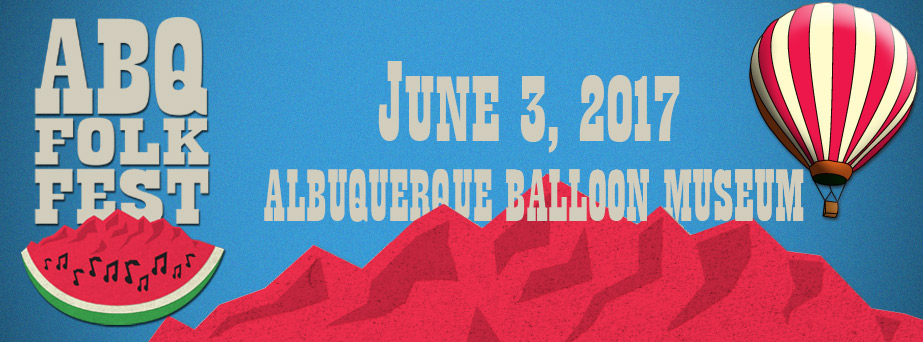


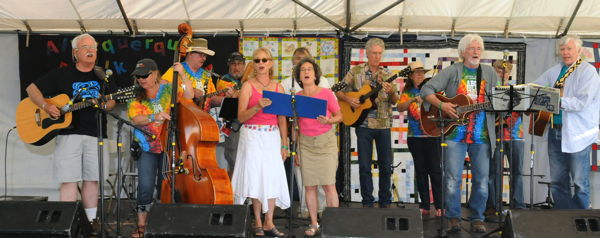
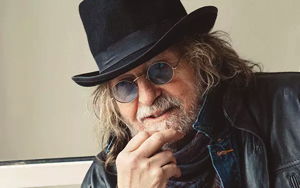
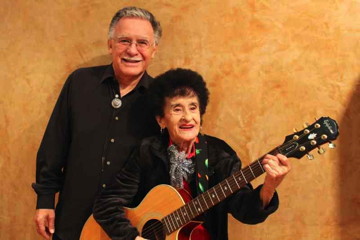
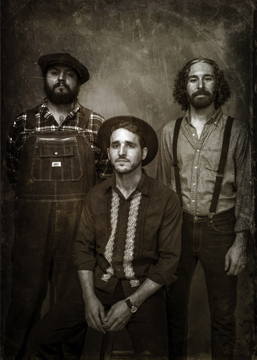

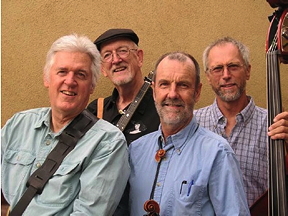
 CONTACT INFORMATION
CONTACT INFORMATION
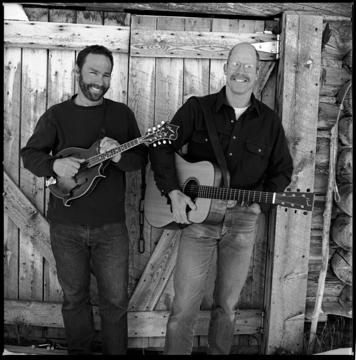
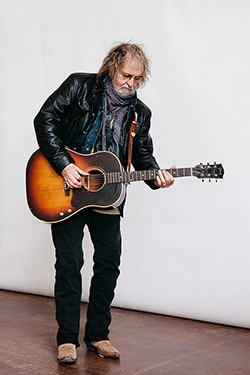 When it comes to down 'n' dirty roots 'n' roll, nobody in the wide world of Americana music today does it better than Ray Wylie Hubbard [
When it comes to down 'n' dirty roots 'n' roll, nobody in the wide world of Americana music today does it better than Ray Wylie Hubbard [
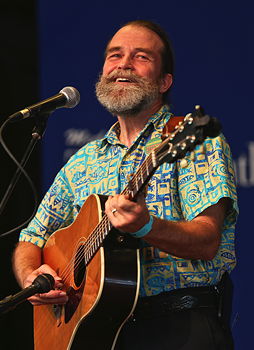
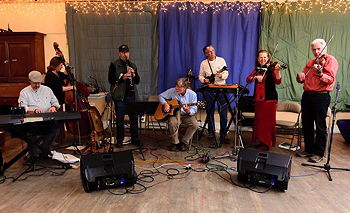
 Lobo Beast 101
Lobo Beast 101 Exciting news! Laurie Lewis and Tom Rozum will be joining us for this year’s ABQ FOLK FEST!
Exciting news! Laurie Lewis and Tom Rozum will be joining us for this year’s ABQ FOLK FEST!
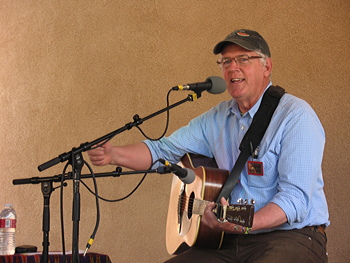
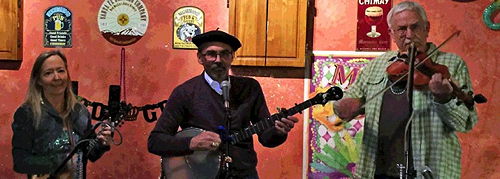
 Apple Mountain Music is located at:
Apple Mountain Music is located at: 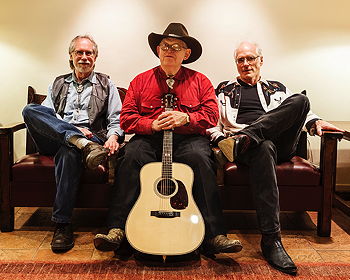 Our Featured Performer this month is Bill Hearne. At last year's Albuquerque Folk Festival, his performance was cut because of weather, so we are delighted that Bill is coming back this year.
Our Featured Performer this month is Bill Hearne. At last year's Albuquerque Folk Festival, his performance was cut because of weather, so we are delighted that Bill is coming back this year. 





